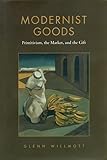Modernist Goods : Primitivism, the Market and the Gift / Glenn Willmott.
Material type: TextPublisher: Toronto : University of Toronto Press, [2008]Copyright date: ©2008Description: 1 online resource (384 p.)Content type:
TextPublisher: Toronto : University of Toronto Press, [2008]Copyright date: ©2008Description: 1 online resource (384 p.)Content type: - 9780802097699
- 9781442688643
- 820.9/112 22
- PR478.M6 W53 2008eb
- online - DeGruyter
| Item type | Current library | Call number | URL | Status | Notes | Barcode | |
|---|---|---|---|---|---|---|---|
 eBook
eBook
|
Biblioteca "Angelicum" Pont. Univ. S.Tommaso d'Aquino Nuvola online | online - DeGruyter (Browse shelf(Opens below)) | Online access | Not for loan (Accesso limitato) | Accesso per gli utenti autorizzati / Access for authorized users | (dgr)9781442688643 |
restricted access online access with authorization star
http://purl.org/coar/access_right/c_16ec
The politicised interpretation of literature has relied on models of economic and social structures that oscillate between idealized subversion and market fatalism. Current anthropological discussions of mixed gift and commodity economies and the segmented politics of house societies offer solutions to this problem and suggest invaluable new directions for literary studies. Modernist Goods uses recent discussions of gift and house practices to counter an influential revisionist trend in modernist studies, a trend that sees the capitalist marketplace and its public sphere as the uniquely determining institutional structures in modern arts and culture.Glenn Willmott argues that a political unconscious forged by the widespread marginalisation of pre-capitalist institutions comes to the fore in modernist primitivism. Such primitivism, he insists, is not superficially exoticist or simply appropriative of the cultural heritage of others. Rather, it is at once parodic and authentic, and often, in the language of Julia Kristeva, abject. Modernist Goods examines such writers as Yeats, Conrad, Eliot, Woolf, Beckett, H.D., and Joyce to uncover what the author views as their displaced aboriginality and to investigate the relationship between literary modernism and aboriginal modernity. By bringing current anthropological developments to literary studies, it aims to rethink the economic commitments of modernist literature and their political significance.
Mode of access: Internet via World Wide Web.
In English.
Description based on online resource; title from PDF title page (publisher's Web site, viewed 01. Nov 2023)


